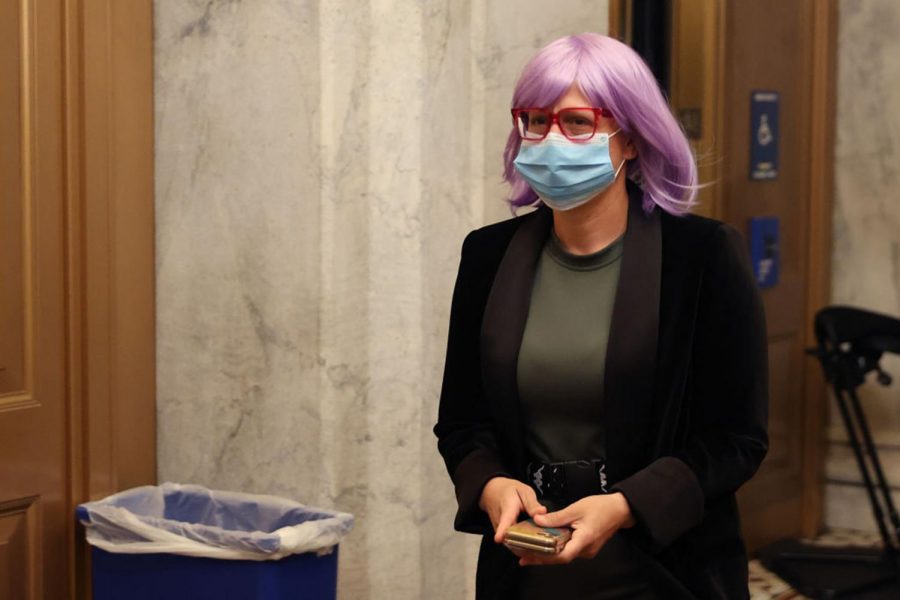Opinion | The filibuster must go to preserve democracy
Image via Chip Somodevilla, Getty Images, TNS
Senator Kyrsten Sinema (D-AZ)
June 9, 2021
Implicit in the way that nearly everyone talks about American politics, even in relatively nuanced media outlets, is the idea that presidents are incredibly powerful, and they are directly responsible for the welfare of the country.
But the government is an incredibly complex machine, and right now Sens. Joe Manchin, D-W. Va., and Kyrsten Sinema, D-Ariz., paired with an arcane, accidental Senate rule, are far more powerful than President Joe Biden. Their obstinance on a single issue is imperiling U.S. democracy.
A hundred scholars signed a June 1 statement warning that Republican-led state legislatures are degrading voting rights in America to the point that they’re concerned about whether elections will be free and fair. The experts warn of legislatures giving themselves the power to override elections as well as restricting access to voting. And if anything, they’re understating the amount of issues that American democracy faces.
The scholars’ main call to action is asking the federal government to “pass national voting and election administration standards” as well as suspend the filibuster, a maneuver in which a senator can block the passage of a bill unless overridden by a 60-vote supermajority. Senators used to have to give a speech on the floor while filibustering, but holding the floor is no longer required, allowing senators to effortlessly kill bills.
Since achieving a 60-vote supermajority is essentially impossible, the filibuster is both a reason that our democracy is in peril as well as a roadblock to passing election standards. Yet senators Manchin and Sinema, whose votes are needed to remove it, cling to this outdated rule.
The filibuster has been represented in popular culture as a heroic stance senators take in order to force their colleagues to listen to the voice of an oppressed minority. The real filibuster never worked that way to begin with, and has only become more dysfunctional in modern politics.
To begin, the filibuster was created by accident. During Thomas Jefferson’s presidency, the Senate eliminated a rule called the “previous question” motion, which allowed senators to force a vote on an issue. It was years before anyone realized that the elimination of this rule allowed them to extend debate indefinitely.
But in the early days, the filibuster wasn’t used as a blunt weapon, like it is today. Between 1917 and 1970, the Senate voted to end a filibuster 49 times. But since 2010, there have been more than 80 votes per year.
During the years when the filibuster was rarely used, it was generally considered too extreme an option, and the political mixing of the parties allowed coalition building. Essentially, there were conservative Democrats and liberal Republicans, so bipartisan bills were much more likely to see passage, and the filibuster wasn’t seen as a necessary obstructive tool. That is, it wasn’t seen as necessary unless the bill in question extended rights to minorities, in which case senators like Strom Thurmond viciously filibustered.
But recently, everything that isn’t bipartisan — which is nearly everything — is being filibustered, or is dead on arrival due to the threat of a filibuster. The gridlock is completely destroying the ability of either party to govern, and thus voters’ ability to discern how well a party is wielding power. Being able to reward or punish the party in power based on their governance is a key part of democracy that the filibuster has essentially demolished.
And yet, some argue that this accidental, systemically racist, gridlocking tool is good for the Senate for three reasons — debate, compromise and fear.
First, they argue that the filibuster forces debate. If the minority party can hold the floor and talk about an issue for a long time, the majority party will have to listen, and grievances and issues will be aired.
Furthermore, the consequence of forced debate will be that senators will find a way to hammer out a deal, putting aside their petty differences to create a bill that at least partially satisfies everyone.
To think that the ability to unilaterally kill a bill would create this type of utopian debate takes a truly astounding amount of ignorance. The filibuster doesn’t hand the minority party a small amount of power they can use to bargain with the majority, it hands them a blunt tool they can use to kill the entire agenda of the party they desperately want to defeat. Any compromise that results in a popular bill hurts the minority party’s chances of winning back power.
And the idea that they want power back, not compromise, is incredibly important. The reason these filibusters have become so ossifying is not that the rule was just created, but that the parties have become more polarized. There’s no longer a real conservative portion of the Democratic Party that can work with a liberal wing of the Republican Party on a bill.
Given the filibuster, the minority party is going to realize that they can completely obstruct the Senate, and the majority party will receive all of the blame. That’s exactly what Sen. Mitch McConnell, R-Ky., did during Barack Obama’s presidency, telling The Atlantic in 2011 that Republicans “worked very hard to keep our fingerprints off these proposals” so that it didn’t look like there had been any “broad agreement.”
But that does raise a concern — if, for example, the Democrats were to kill the filibuster right now, and Republicans were to take back power, wouldn’t they have handed their opponents the ability to rule?
This is a legitimate concern for whichever party is considering nuking the filibuster, but it’s not a good enough reason to keep it. Just because one party isn’t going to get rid of the filibuster doesn’t mean the next won’t go ahead and do it when they take power.
More importantly though, it would be better to live in a country where the party in power can pass laws, and the voters can decide on their merits, than a country where nothing ever gets done. In a healthy democracy, voters would be able to consider what the party in power has done every election cycle, but today the lack of real legislation clouds voters’ ability to judge governance.
Complicating things, many senators seem to like the way that the filibuster takes the blame. They can plead uselessness when asked why they get nothing done — they can blame the system. We need to remove this crutch so that we can judge senators and presidents based on their actual accomplishments while in office, whether you agree with them or not.
All of which brings us back to Manchin and Sinema. Since there are exactly 50 Senate Democrats, each one is needed to get rid of the filibuster and pass laws, handing Manchin and Sinema not just the power to decide what happens to the filibuster, but to the entire Democratic agenda.
And right now, they’re deciding to kill all of it. Manchin told CNN he thinks passing a voting rights bill without Republican votes “will destroy the weakening binds of our democracy,” and Sinema believes the filibuster preserves the comity of the Senate.
The most important piece of legislation currently being considered, the For the People Act, which would begin to address some of the issues that experts identified in their June 1 letter, cannot pass without bipartisan support or filibuster reform.
Manchin and Sinema could not be more wrong in their conception of what the filibuster does. American democracy isn’t in some philosophical danger in the far-off future, it is actively crumbling, with experts sounding the alarm. Manchin and Sinema must right this ailing ship or forever be remembered for doing nothing when they had the chance.
Lucas DiBlasi writes primarily about politics, economics and music. Feel free to email your opinions on Weezer (or whatever else) to him at [email protected].








